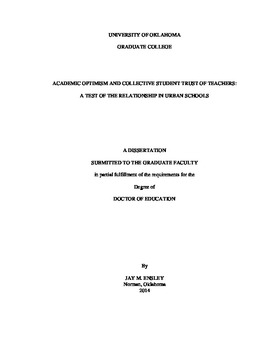| dc.contributor.advisor | Adams, Curt | |
| dc.contributor.author | Ensley, Jay | |
| dc.date.accessioned | 2014-12-11T16:59:30Z | |
| dc.date.available | 2014-12-11T16:59:30Z | |
| dc.date.issued | 2014-12 | |
| dc.identifier.uri | https://hdl.handle.net/11244/13866 | |
| dc.description.abstract | The purpose of this study was to test the relationship between academic optimism and collective student trust in urban schools after controlling for contextual conditions that can enhance or impede cooperative student-teacher interactions. This study was built upon a conceptual framework using the collective trust theory to better understand how norms such as academic optimism impact collective student trust. Quantitative survey data were collected from teachers and students in 79 elementary and secondary schools in a large urban district.
Findings indicate that academic optimism is related to student trust in teachers, even after controlling for differences in school composition. Evidence from a post hoc analysis of the data suggests that student trust decreases as school level increases, yet the academic optimism-trust relationship still exists in secondary schools. | en_US |
| dc.language | en_US | en_US |
| dc.subject | Education, Curriculum and Instruction. | en_US |
| dc.title | Academic Optimism and Collective Student Trust of Teachers: A Test of the Relationship in Urban Schools | en_US |
| dc.contributor.committeeMember | Forsyth, Patrick | |
| dc.contributor.committeeMember | Lake, Vickie | |
| dc.contributor.committeeMember | Edwards, Beverly | |
| dc.contributor.committeeMember | Ford, Timothy | |
| dc.contributor.committeeMember | Adams, Curt | |
| dc.date.manuscript | 2014-12-10 | |
| dc.thesis.degree | Ed.D. | en_US |
| ou.group | Jeannine Rainbolt College of Education::Department of Educational Leadership and Policy Studies | en_US |
